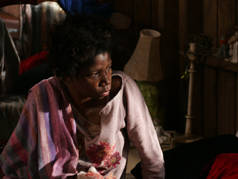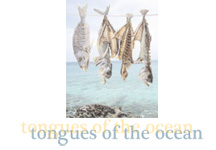In 1965, an African-American playwright by the name of Douglas Turner Ward wrote a play he called Day of Absence, which told the story of a small town -- any small town -- in the Deep South in which the white inhabitants discover on a particular day that all the black people have disappeared.
When this fact becomes general knowledge, the establishment comes to the brink of chaos. Without its black labor force, the town is paralyzed because of its dependence on this sector of the community.
Part of the reason I agreed to take the job of Director of Cultural Affairs, and much of the reason I left, was that, in many ways like African-Americans in the 1960s USA (and black Bahamians, and people of African heritage the world over), cultural workers in The Bahamas -- artists, musicians, writers, actors, directors, dancers, designers, craftworkers, you name it -- are marginalized, disrespected, and taken for granted in our nation.Thirty-six years after independence and forty-one years after majority rule, creative workers in our country are unable to find work in the areas in which God has gifted them. There are virtually no avenues in The Bahamas to enable creative people to develop and hone their talents, or to enable them to make use of them when they are developed. Our greatest brain drain is arguably in the area of the arts; like Sidney Poitier over sixty years ago, Bahamians who want to exercise their talents in the cultural industries are faced with the choice of pursuing their callings as hobbies at home, or of leaving home to make a living by their gifts elsewhere. And we are all the poorer for it. That we appear to be unaware of the absurdity of this state of affairs in a nation which welcomes several millions of tourists to our shores annually is indicative, to my mind, of our abject conviction as a people that Bahamians, and particularly Bahamians of colour, are congenitally unable to produce, behave, or perform at any level that could possibly be considered world-class, and that it is a waste of time, money and effort to believe anything else.Newsflash. No country can be great, or even good, without its artists. When all has passed away, when all has crumbled and gone, it's not the speeches of the politicians, the enforcement of the country's laws, the profit and the loss, or the tourist arrivals that are left behind to tell the story of the people who once walked this earth. It's the art. It's the statues, the paintings, the music, the poetry. Until we invest and believe in our art, and until we respect our artists, our country will never even be.And so I'm calling for a Day of Absence in honour of all cultural workers in The Bahamas and around the world.On February 11, 2009, I'm asking us all to stop -- for a day, for a moment even, and imagine our country, our world, if we woke up one day and all the artists and cultural workers had disappeared.I see it as a symbolic day, to be started this year and go on annually, where artists can come together in person or in cyberspace, and blog, email, sing, act, perform, speak, or whatever they want to do, in honour of art and artists themselves.I chose February 11 because it's my father's birthday, and the disrespect began to be evident when he was Director of Culture. It wasn't so clear while he was living. As with so much in this country, the people who did not respect what he stood for, who did not respect his art, respected him. Many of the leaders -- the politicians of his day, and certainly the senior civil servants -- had been his schoolmates, had known him and his family for years, and trusted him when he said he could do things. It's for this reason and none other (well, maybe it was also because of our new-nation status too) that culture flourished to the extent that it did during the 1970s and early 1980s in The Bahamas. But his death in August 1987 took everyone by surprise.People say that no one is indispensible, and there is certainly truth in that; but some people, especially when they fill a gap that is created because of ignorance or prejudice or disrespect, are irreplaceable. My father appeared to be one of those people -- not because of any specialness about him (though he was special) but because of the fundamental emptiness and fear of self of the Bahamian people and their leaders. Our cultural development didn't take place during his tenure because our country respected culture. It took place because our leaders respected him. It took the government 7 years to replace him because they had taken him and his position and the work he was doing so much for granted, and had no idea what they had lost or how to replace it.I know governments are only a part of the equation, but the things he left in place when he died in 1987 have yet to be replicated or replaced by the government or the country of The Bahamas, and culture has absolutely no respect in the national discourse.And so: Day of Absence. It's to be a day like Green Day or World Hunger Day -- a movement, an idea that can catch fire, a spark that can spread without specific action, but just as people see the idea and become ignited by it.Art and culture are the most human, the most divine, the most basic, and the most true actions that any living human being can do. But in The Bahamas (and throughout the world too) arts and culture are far more likely to be laughed at, talked down about, ignored, dismissed, insulted, disrespected, and taken for granted than any other action.There are more creative people and more creative activity in our nation than there are other people with special interests. Yet our government has no legislation that supports our activity. It has a whole national sporting complex in Nassau and has sports fields and sports equipment and sports activities throughout the Bahamas, and it has legislation to govern hotels and tourist activity and education and health and disability, but nothing either in law or on the ground, to support, encourage or develop artistic activity.And yet artists and cultural workers in The Bahamas and throughout the world are the invisible backbone of nations. When people think about what is "Bahamian" they think about what we produce, not what the doctors, lawyers, athletes, or politicians produce. This is true in every part of society, from top to bottom, from secular to religious.And yet no one wants to recognize us, respect us, hire us, support us, or acknowledge that we exist or are important.The Day of Absence concept is designed to get us as artists and society as general to imagine a world without artists. It is a day on which artists can stop what they are doing so that people can notice how fundamental art and artistic production and cultural activity are to everyday life. It is a day on which we encourage DJs to stop playing music for an entire minute, hour, or day, when we ask talk show hosts and newscasters and writers and editors and songwriters and artists and straw workers and advertising agencies and whoever else works in the creative field, is unappreciated for their activity, is producing work that people think of as "soft" or unnecessary, to stop doing what they do so that the people who do not respect us understand for just one moment or just one day that we are important, that without us society stops.It's a day to wear white because it's a day without colour. Artists govern colour.It's a day to be silent because it's a day without music, writing, speeches. Artists produce music, writing, speeches.It's a day to stop spending cash because without artists, money has no meaning -- the designs on our coins and our paper money were created by artists.It's a day to worship silently, without music, or pretty clothing or the Bible, because artists are the vehicles God chooses to express the glory of His creation and Himself.It's a day of reflection, of discussion, of absence in honour of the creative spirit that our society insists on beating down, on disrespecting, on crushing.On February 11, 2009, I will observe it. Come join me.




